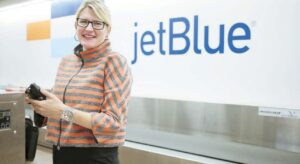
In A Nation Of Workaholics And Vacation Shaming Women Take Advantage Of Paid Vacation Time. Is It Time For The Other Half Of American Workers To Pack Their Bags Too?
by Heather Cassell
US working women are more likely to go on vacation than their male counterparts.
The Alamo Family Vacation Survey’s in 2015 and 2016 found that during the past two years 63 percent of women took their paid time off in both years versus 54 and 52 percent men, each year respectively.
The surveys also discovered that women were more decisive than men when it came to family vacations. Women know where they want to go on vacation, 43 percent versus 34 percent of men. They know what attractions they want to see and what places they want to go to, 40 percent versus 26 percent of men. They know where they want to eat and what to cook, 35 percent versus 24 percent of men.
Getting ready to take off, 49 percent of women know what to pack and bring, in spite of packing being the only thing that stressed them out a week before taking off for the getaway. Despite the stress, they push through it rather than avoid making the decisions of what should go into their suitcase and what should stay home, versus 28 percent of men.
Shame On Those Who Are Sipping Fruit Filled Cocktails With Umbrellas And Lying On Sunny Beaches!
If only the rest of America could go on vacation.
However, that might not be happening anytime soon, in spite of more Americans receiving paid vacation as a part of their benefit packages from employers 56 percent in 2016 versus 52 percent in 2015.
Vacation-shaming affects all generations, but millennials have caught the workaholic bug in a serious way and vacation-shaming is one of the symptoms.
According to the annual travel survey conducted by Alamo Rent A Car, researchers found that 59 percent of employed millennials admitted to feeling a sense of shame for taking or planning a vacation compared to 41 percent of Gen Xers and Baby Boomers (people who are 35 years old and older).


But worse, millennials are vacation-shaming their fellow millennial co-workers more than their older co-workers, 42 percent versus 24 percent. And they are admittedly “somewhat serious” about their vacation-shaming more so than their older counterparts, 42 percent versus 22 percent. Overall, a little less than half of American workers, 42 percent, over all think their co-workers aren’t joking, but “seriously shaming them.” Are you serious? Yes they are.
Nearly Half, 47 percent, of all American workers surveyed reported feeling a “sense of shame or guilt” at their workplace for taking time off to go on a vacation. The same percentage of workers felt they needed to justify using their vacation time to their employer.
The sense of shame was so strong for some of the respondents that 22 percent admitted that it was at least somewhat likely to keep them from going on or planning a vacation.
“This year’s research indicates that vacation shaming is a real workplace issue that can, in some cases, discourage hard-working Americans from taking well-deserved time off with their families,” says Rob Connors, vice president of brand marketing for Alamo Rent A Car. “In addition, our survey shows employees continue to leave a large percentage of paid vacation days on the table.”
Gary Oster, managing director of Project: Time Off, an initiative of the US Travel Association championing to win back America’s “Lost Week” of vacation, says, “It’s long past time to stop wearing unused vacation days as a badge of honor.”
“By forgoing vacation days, Americans are missing out on stronger bonds with family and friends, greater fulfillment and productivity in their work lives and enhanced health and wellness as a result of time away from the office,” says Gary, who worked on the survey commissioned by the US Travel Association to examine the state of American Vacations and paid time off.
While the travel association and its partners have something to gain from hard data pointing toward taking a vacation the association took it seriously and there is validity to its findings.
The association tapped Oxford Economics to review filings for 114 public companies with the Securities and Exchange Commission covering 377,000 private-sector workers. The statements report the paid vacation time and number of employees for each company.
Remember Recess?
What happened to the days when we counted down the clock to run out of the classroom to play at recess time?
The top two reasons people say they aren’t using all of their paid vacation is that they are saving for an extended vacation the following year. In order to get a longer vacation they are rolling over their earned vacation days. Two-fifths of the survey respondents say they left five or more vacation days unused, that’s 40 percent. That’s noble and valid, considering that respondents to the survey reported the time spent on vacation would be quality time with their family or significant other. That includes being unplugged, 44 percent versus 48 percent, in 2015 and 2016 respectively.
Respondents also reported that out of a list of 21 things they wanted to get out of their vacations, the most popular were to spend quality time with loved ones, get a break from their routine, rest and relax, bond/reconnect with family and see family or friends.
Spending time with family on vacation was an important factor more this year than last year and that includes extended family. The survey found that adults appear more likely now than a year ago to go on vacations with extended family, 73 percent compared to 67 percent, respectively.
But the fact remains, the second top reason why vacation days went unspent is that American workers are simply too busy at work to take the time off, according to the survey.


What Are We Losing By Working All Of The Time And Not Playing?
That isn’t stopping the 41 percent of the people who responded to the survey from leaving some of their vacation time on the table rather than taking all of their vacation days.
“It’s an epidemic of overwork,” Cheryl Rosner, CEO of Stayful.com, a hotel bidding and booking site, told Forbes Magazine last year when similar figures surfaced from a report by Project: Time Off.
“Forty-one percent of Americans don’t take their paid time off,” she says, shocked by the figures. “On those days, you’re paying your employer to be at work.”
Adam Sacks, president of tourism economics at Oxford Economics and author of the Project: Time Off study agrees with Cheryl that employees are “basically giving away their time for free,” he says, because of “use it or lose it policies” or caps and expiration dates on banked paid vacation days.
“I didn’t realize how extreme it was until I saw the research,” Cheryl adds.
That means Americans are throwing away an estimated $52.4 billion every year simply because they won’t take time off from work, reported the Wall Street Journal.
Consequentially, all of these unused days off could cost US businesses an estimated $224 billion simply because employees are rolling over unused paid time off, according to one study, reported Forbes Magazine. That figure doesn’t include sick or personal leave, which the debt for that alone grew by $65.6 billion in 2014, the latest figures available, reported the Journal.
Those numbers don’t factor in the costs of stress and burnout because people are not taking time off to rest and connect with family and friends and basically have a life. The results could be detrimental to work colleagues and employers.
“This is not only not good for employees, it is not good for companies,” says Adam.
However, Adam points out another and perhaps more dangerous issues for companies and employees aside from burnt-out workforce, which leads to lower productivity and retention, companies face a huge cash-flow issue. With unspent vacation days on the books it’s a liability and a “burdensome one from a cash-flow standpoint,” because when employees leave a company the corporation must payout those vacation days, he says. That could rack up fast with each employee payout averaging $1,898 to $2,609 depending on the size of the company.
So, may be women and the companies that allow them to put out the, “I’m on vacation sign,” are smarter for taking their time off and running off to sunnier shores.
Book you’re your place in history at Bride Pride contact Heather Cassell at Girls That Roam Travel in association with Travel Advisors of Los Gatos at 408-354-6531 or 415-517-7239 or at
To contract an original article, purchase reprints or become a media partner, contact







